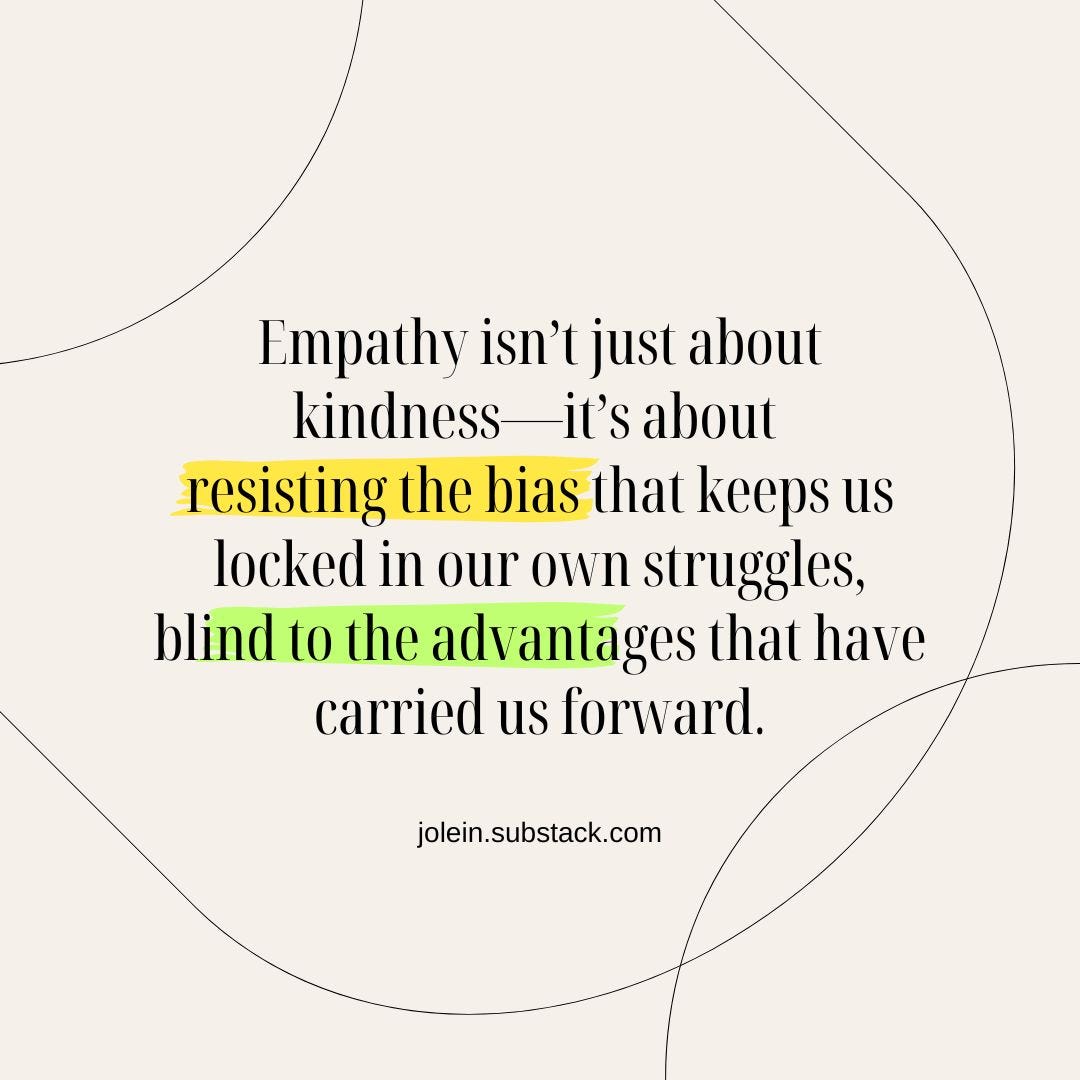The Psychological Study That Keeps Me Fighting for Empathy
Thomas Gilovich and Shai Davidai’s research on the "headwinds/tailwinds asymmetry"
Why can I suddenly lose empathy for the people closest to me? It sickens me how fast I can go from understanding to resentment, generosity to frustration. I see it everywhere—in myself, leadership, classrooms, politics. We assume others have it more manageable, that we carry a heavier load and that our struggles are uniquely unfair. Yet, we know, academically, this isn’t true.
There’s a psychological phenomenon that I return to often in my work, one that reminds me why empathy isn’t just a virtue—it’s a necessity.
Thomas Gilovich and Shai Davidai’s research on Headwinds/Tailwinds Asymmetry explores a simple but powerful idea: we are wired to notice our struggles more than our advantages.
This asymmetry plays out in every aspect of life. Siblings believe they had it tougher than their brothers or sisters. Political party members think the system is rigged against them. Sports1 fans argue that their team has the hardest schedule. Even teachers who claim that their grade level or subject is the hardest. Across different contexts, we fixate on the headwinds that slow us down and ignore the tailwinds that help us move forward.
And that’s where the real damage happens. This perception of disadvantage doesn’t just breed resentment—it justifies moral flexibility. When people believe the odds are stacked against them, they become more willing to bend the rules. The thinking goes: If life is unfair to me, why should I play fair? These small rationalizations, taken collectively, fuel dysfunction at every level—schools, workplaces, governments, entire societies.
Why do we think this way? Because struggle demands attention. Obstacles require effort to overcome. But advantages? They quietly fade into the background. We adjust to good fortune almost immediately, but setbacks remain sharp in our minds. This availability bias skews our perception of fairness—we see barriers clearly while benefits go unnoticed.
That’s why empathy matters. If we know that our minds are wired to focus on struggle, then we have to make a deliberate choice to see the full picture. We have to train ourselves to notice the tailwinds—the invisible forces that have helped us along. Not so we can feel guilty, but so we can stay grounded in gratitude. So we can stop assuming everyone else has it easier. So we can resist the resentment that fractures relationships and fuels division.
No one moves through life without tailwinds. If we assume others have it easier than we do, we risk missing the full picture. Fighting for empathy isn’t just about being a good person. It’s about resisting the natural bias that keeps us trapped in our own struggles, blind to the forces that have carried us forward.
And actually, empathy will make you a better coach too.
Coaching isn’t just about strategies and feedback—it’s about understanding the complete picture of someone else’s reality. If you can’t identify your own headwinds and tailwinds, you’ll find it difficult to see theirs. You’ll mistake resistance for defiance rather than fear. You’ll interpret exhaustion as apathy. You’ll anticipate compliance instead of seeking to understand motivation.
Empathy forces you to slow down and ask, Who do you need me to be?—a question that moves coaching beyond one-size-fits-all advice into something transformative. Sometimes, you need to be a Buddy, reducing stress in the moment. Other times, you need to be a Parent, setting firm expectations with care. Or a Therapist, helping someone untangle deeper issues before they can take action. If you’re locked into your own frustrations—your own sense of unfairness—you lose the flexibility to meet people where they are.
That’s what great coaching requires: reflective thinking, adaptability, and the ability to hold multiple truths at once. You can acknowledge that someone is struggling and still push them to grow. You can recognize your own tailwinds and advocate for fairness. You can see your headwinds and resist resentment.
Empathy isn’t just a virtue—it’s a skill. If you want to lead, teach, or coach effectively, it’s a skill you have to practice.
To summarize, the Headwinds/tailwinds Asymmetry threatens people’s ability to be empathetic in several ways:
It makes us self-centered in our struggles. Since we naturally focus on our own obstacles more than our advantages, we assume our challenges are uniquely difficult—making it harder to acknowledge that others are struggling too.
It fuels resentment instead of understanding. When we believe others have it easier, we’re more likely to feel bitterness than compassion, seeing them as lucky or undeserving rather than recognizing their unseen difficulties.
It justifies moral flexibility. Feeling disadvantaged can lead people to rationalize questionable behavior, believing they are simply balancing the scales rather than acting unfairly.
It weakens gratitude, which fuels empathy. Because we adapt quickly to our advantages, we don’t feel as grateful for them—making it harder to extend grace to others who may be facing struggles we can’t see.
4 Things to Know About Empathy-Driven Coaching
This piece was originally an Everyday Principal issue, a highly recommended source. It has been refined slightly.
This was hard for me. I don’t know anything about sports. I did enjoy the Kendrick Lamar concert recently though.












This is the reason that toxic working environments become impossible to progress and innovate. Everyone is so busy defending their territory there isn't time to be empathetic towards anyone else.
Love this article. Empathy as a skill is going to stick with me. Thanks for this!